Businesses today operate in a dynamic digital economy where they need effective management systems for tracking their relations, promoting their activities, and performing project management tasks. This is where CRM (Customer Relationship Management) tools come into play. A Customer Relationship Management tool is software that helps businesses organize, track, and manage their customer interactions. This paper offers an overview of the best ten CRM tools available in the year 2024, their strengths, and how they can help any business optimize efficiency.
In this article
1. What Are CRM Tools?
CRM management tools are defined as customer relationship management tools. They are advanced platforms used by companies to organize and manage their customer-related data, activities, communications, and business processes. In short, they are managed as centralized places that store customer information, marketing operations, and even some processes associated with project management. The limits of CRM management tools would be perhaps the district of boards with the possibility of communicating and performing sales and sharing information and services to clients.

2. Benefits of CRM Tools
Developed Relationships and Communication with Customers: Organizations are able to interact with clients at a more comprehensive level through storing and utilizing the data, enabling businesses to interact and get to know the clients on an intimate level, thus increasing the chances of them being repeat clients.
Easier Sales Processes and Higher Output: Cramming too many repetitive tasks such as data entry, data collection, and the shuffling of appointment schedules and reminders leaves little space for the sales teams to concentrate on the crucial requirements of the position that is selling.
Enhanced Data Management and Business Analytics: It allows data-based decision-making and strategic planning as a CRM tool that adds tremendous knowledge of the customers’ behaviors and trends.
Enhanced Marketing through Targeted Campaigns: Tactics for CRM marketing tools help in the precise targeting of the audience as well as the messaging hence increasing engagement and conversion rates.

3. Top 10 CRM management tools of 2024 (CRM tools list)
Simple CRM Tools
Simple CRM tools are designed for ease of use and are perfect for small businesses or startups that may not require complex systems. They simplify the process without compromising on essential features.
Top Recommendations:
HubSpot CRM
Features:
- Contact and lead management systems
- Email marketing automation and integration
- Management of sales pipeline with deal features
- Analytical and report-generating tools
- Integrates Ultimo systems within the marketing, sales, and service hubs of Hubs
- Basic CRM functionality for free
Pros:
- These features are free core CRMockup ultimately free to small businesses and start-up protective outcome.
- This platform is relatively very pleasant and easy to use because it is user-friendly.
- It is possible to avoid usage of other center Hubs to avoid wastage.
- Take education guides along with the DAVIS lesson.
Cons:
- Users/clients outdo the procedure in that with these and all covering that other More hub over time may be expensive.
- Other users may want more customization than what is offered compared to the other all-in-one CRM packaging.
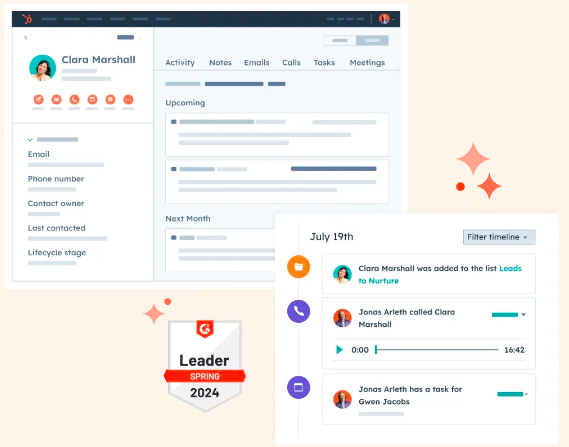
Zoho CRM
Features:
- Sales automation, lead, and contact management
- Email integration and marketing automation
- Advanced analytics and reporting
- Social media integration
- Customizable dashboards and modules
- AI-powered sales assistance with “Zia”
Pros:
- Offers a high degree of customization, which allows tailoring to specific business needs.
- Competitive, affordable pricing with a variety of plans to suit different business sizes.
- A comprehensive set of features, including AI-based tools, that are continually being updated and expanded.
- Integrates well with other Zoho Suite applications and a wide range of third-party services.
Cons:
- Some users may find the interface less intuitive, with a learning curve for advanced features.
- Customer support can be inconsistent depending on the plan.
- The vast array of features may be overwhelming for users who need a straightforward solution.
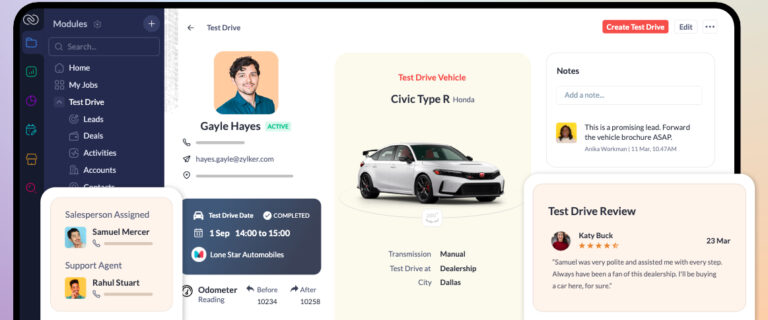
CRM and Project Management Tools
There are some CRM tools that encompass project management features enabling an all-in-one package for businesses that coexist in managing customers and projects.
Benefits: Consolidated view of projects with customer information, improved teamwork, and integration with other features within the workflow.
Insightly
Features:
- Key strengths include contact and lead management as well as management of tasks and projects.
- Combines pipelines and workflows with extensive analytics to track progress and outcomes over time.
Pros:
- Has the advantage of a user-friendly, customizable interface from where users create customizable dashboards and reports.
- Allows for integration with popular tools such as G-suites.
- Ability to utilize both project management and customer management tools within one software.
Cons:
- Might be a steep learning curve for those new to CRM tools as the software is primarily a CRM.
- Occupancy costs may be limited as the more advanced features are found in higher pricing tiers.
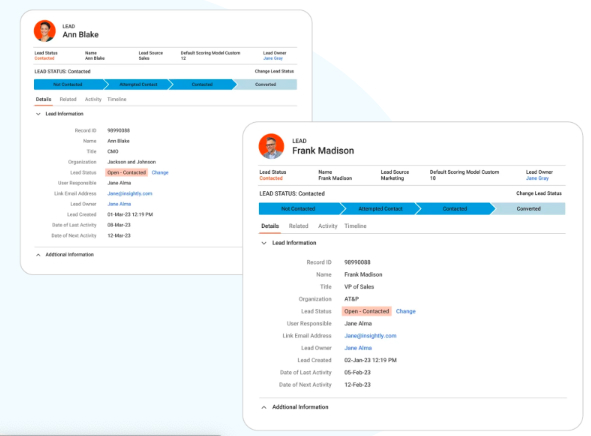
Monday.com
Features:
- Helps users track customer contact and manage the sales pipeline through automated processes.
- Allows for tracking hence improving the performance of employees and outcomes associated with campaigns.
Advantages:
- Highly customizable striving to meet different team needs.
- Allows for integration with other tools hence improving project outcomes.
Disadvantages:
- Limited if MSC tools are used as Monday.com does not have advanced features.
- Pricing may be an issue depending on how many features are required.

CRM Tools for Marketing
These tools focus on enhancing marketing strategies by offering comprehensive campaign management and customer engagement capabilities.
Importance: Drives better engagement, increases lead generation, and optimizes marketing strategies.
Top Picks:
Salesforce Marketing Cloud
Features:
- Omni-channel marketing automation
- Customer data integration and segmentation
- Advanced analytics and reporting
- AI-powered insights and personalization
- Dynamic content creation tools
Pros:
- Extensive marketing capabilities with powerful automation features.
- Seamless integration with Salesforce CRM products.
- Robust data management tools for precise targeting and segmentation.
Cons:
- High cost, which may be prohibitive for small businesses.
- Complex setup and potentially steep learning curve for new users.
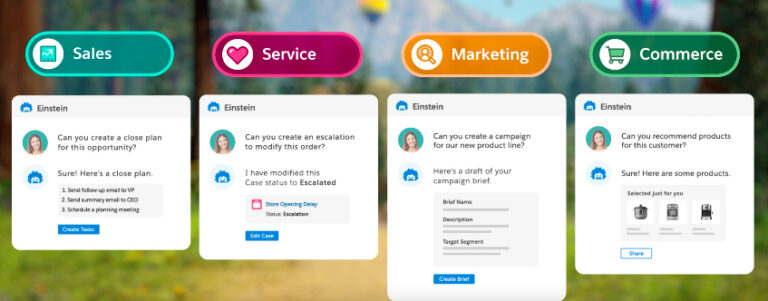
Mailchimp
Features:
- Automated one-off email marketing
- Management of audiences and running targeted campaigns
- Features of basic CRM system for contact management
- Reports and analytics for email reports
- Social media components
Pros:
- It is user-friendly and can be used by non-professionals.
- There is a free tier for start-ups and small businesses.
- Adequate linkages to social media and online shopping outlets.
Cons:
- Also because email marketing is the main focus, the scope of general CRM functionality available is narrow
- More complex options are not as effective as those other CRM that focus on such tools.
Full-featured CRM Software Tools
For businesses seeking comprehensive solutions, full-featured CRM tools provide extensive functionalities that cover multiple aspects of business operations.
Features and Benefits: Deep integration possibilities, advanced analytics, and wide-ranging customizable features.
Notable Solutions:
QuickCEP
Features:
- Comprehensive CRM features for sales, service, and marketing
- Advanced analytics and reporting
- Customizable dashboards and workflow automation
- AppExchange marketplace for third-party integrations
Pros:
- Highly customizable platform to suit specific business needs.
- Extensive community and support resources.
- Scalable with a wide range of features to grow your business.
Cons:
- Expensive, especially for smaller businesses or those just starting out.
- Complexity requires a significant learning curve and dedicated administration.
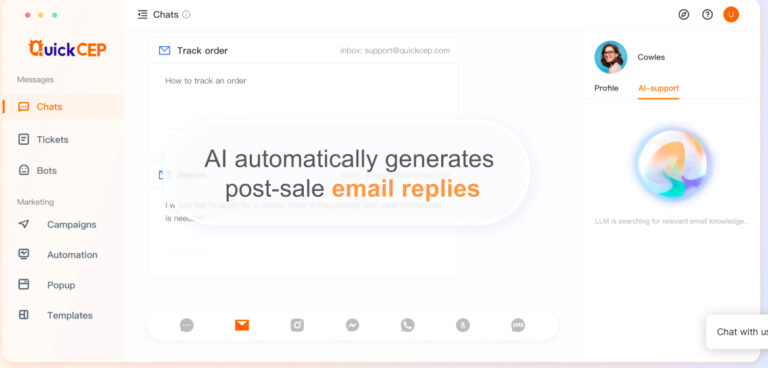
Microsoft Dynamics 365
Features:
- Integration of CRM and ERP capabilities
- AI-driven insights and business intelligence
- Sales, customer service, and field service modules
- Customizable business applications for various industries
Pros:
- A unified platform that combines multiple business processes.
- Strong integration with Microsoft products (e.g., Office 365, Azure).
- Scalable solution is suitable for large enterprises.
Cons:
- Can be complex to implement and manage without experienced IT staff.
- Higher cost, which may be a barrier for small businesses.
Social CRM Tools
The rise of social media has given birth to social CRM tools that help manage customer interactions on these platforms, fostering a more engaging and responsive presence.
Overview: Aimed at improving brand-customer interactions on social platforms, tracking sentiment and engagement metrics.
Top Social CRM:
Hootsuite
Features:
- Social media management and scheduling
- Analytics for social media performance
- Team collaboration tools
- Social listening and monitoring capabilities
Pros:
- Comprehensive social media tool that covers multiple platforms.
- User-friendly interface suitable for managing various accounts.
- Offers free and affordable plans for small businesses.
Cons:
- CRM features are limited; primarily a social media management tool.
- Some advanced features require higher-tier plans.
Sprout Social
Features:
- Social media management and analytics
- Customer engagement and communication tracking
- Content scheduling and publishing
- Social listening and sentiment analysis
Pros:
- Robust social CRM tools for engaging and understanding your audience.
- Comprehensive reporting and analytics for informed decision-making.
- User-friendly interface with excellent customer support.
Cons:
- Premium pricing might be a hurdle for smaller businesses.
- CRM capabilities specific to social media interactions, limit broader requirements.
4. How to Choose the Right CRM Tool for Your Business
Selecting a CRM tool is all about a simple evaluation of several factors in order to make sure your business needs are met: Business size and industry specifics. All industries are distinct, for example, the retail company for example would need to have inventory integrations but in the case of a service business such a company would be interested in cutting-edge customer service.
Budget Considerations: First and foremost, CRM tools are available at various prices, consider what features should not be missed out on and if such a tiered price level system would be advantageous to you as an organization.
Scalability: Be sure that it is possible to scale the CRM along with your organizational needs, including the number of users or features available as required.
Integration Capabilities: Confirm if the CRM tool capabilities would be able to work alongside the existing software in use (like the email system or the eCommerce platform in use) to allow for a consistent and unified flow of data while avoiding redundancy.
Testing and Trial Options: A good number of CRM tools have made it easy for potential customers to test their solutions by offering free trials or demo versions. This however becomes a non-issue as one does not want to commit themselves financially unless they are fully satisfied with the tool.
Conclusion
However you may feel as if CRM tools aren’t for your business process. A great solution to address that is undoubtedly to consider purchasing CRM tools, they will increase efficiency and positively improve customer relationships. These tools are outfitted for every conceivable business type and size in the market today, including simple designs, superior marketing tools, advanced project management options, or full-suite Customer Relationship management services. Look for a CRM option focusing on your business objectives and scaling your performance and customer interactions beyond limits in 2024. Make an effort to research these options thoroughly, win the market by implementing necessary changes, and get the perfect CRM tool for your business.



